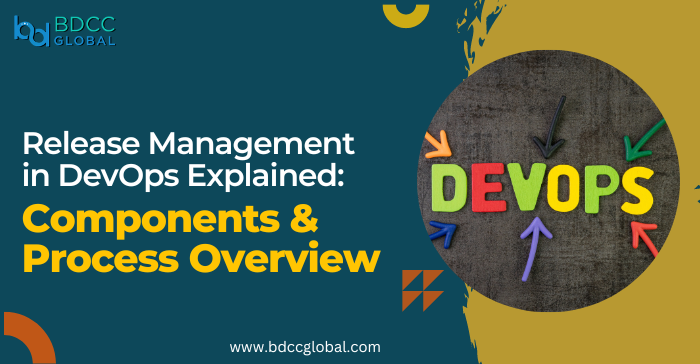
While organizations are embracing DevOps methodologies, worldwide DevOps practices are evolving rapidly. DevOps has introduced a new approach for implementing faster SDLC and flexible release management.
DevOps adoption has revolutionized the entire process of Release Management. The method of successfully implementing release management using DevOps differs from one organization to another. This article will explore the components and procedures associated with release management.
“Say goodbye to software delivery headaches with seamless Release management in DevOps.”
What is Release Management?
Release management involves planning, scheduling, and controlling code releases and deployments. It avoids incomplete software feature releases and code deployment delays using a continuous approval mechanism and feedback loops. Furthermore, it facilitates a smooth application transition from one environment to another when combined with management in DevOps.
Components Of A Release Management Process
- Release Model (It is for performing project planning)
- Release Policy (It defines the release standards based on requirements)
- Release Template (It’s a reusable workflow to automate activities)
- Release Plan (It’s a roadmap for deploying code release to production)
- Release Pipeline (It is part of the release process)
- Release Value Stream (It creates value based on the releases)
- Major Release (It combines many release units based on business impact)
- Minor Release (It combines fewer release units that are not critical)
Release Branching Strategy in DevOps
In DevOps, the branching strategy maintains release management. The DevOps master controls the feature branch checkpoints before merging any code change through pull requests. He reviews the code push and approves the requested pull request based on pre-defined automated jobs.
Release breaching strategy makes creating, updating, and merging multiple CI builds through DevOps pipelines. It tracks down the code versions faster with better code management. It allows the developers to create individual story branches to work independently on separate user stories.
Process overview of Release Management in DevOps
The overall Release Management process flow is easy to follow. The Release manager can divide the process into multiple subprocesses to execute code changes effectively and efficiently. Let’s discover the flow of changes through the Release Management process.
Source Code Management (SCM)
SCM aims to track and manage the Source Code based on future code changes. It provides a detailed history of all code development activities that have happened so far. It back up every code version that has been pushed through DevOps pipelines.
Development Phase
In this phase, the developers create Pull Requests with newly created release branches in the sprint branch. The Release Manager reviews the code and merges it with the source branch. The QA DevOps teams validate the code consequently to detect code bugs and defects.
Release Planning
The Release Manager defines the scope and content of upcoming releases to the Product Owner. The process follows all release management policies and aligns with the release packages for creating, deploying, and testing the release.
Release Build & Deployment
This process involves developing all essential release components for validation and testing. Once all is ready, the Release Deployment process manages the deployment cycles from the development to the production environment. It takes care of the documentation process to notify the end-users.
Release Closure
The DevOps master formally concludes all release operations after merging release branches with the main branch. He then communicates the release outcome with other project teams.
Best Practices For DevOps Release Management
DevOps release management process evolves based on organizational requirements. However, here are some best practices to ensure the successful implementation of DevOps release management.
Define Success Criteria
The Product Owner should define the success criteria to release and QA managers. It should define the critical release metrics and end-user acceptance criteria for the developers.
Streamline CI/CD with QA
QA engineers should integrate QA test cases and feedback loops in the earlier development cycles to detect potential issues and code defects faster. This helps DevOps teams to streamline continuous delivery through DevOps CI/CD pipelines.
Tools For DevOps Release Management
- Jenkins (CI/CD pipeline management)
- Ansible (Application configuration management)
- Chef (CI/CD orchestration)
- XL Release (Release management tool for Continuous Delivery)
- IBM UrbanCode (Release automation tool)
Automation
Automating repetitive workflows and operational tasks reduce developers’ efforts. It improves the team’s productivity by reducing process completion times.
Immutable Development
“Immutable” means “unchangeable.” So, immutable development practices maintain code quality without impacting the system infrastructure. This helps reduce frequent code bugs and configuration issues through different releases.
Strive for Minimal Customer Impact
Modern software needs continuous upgradation without impacting the end-user experience. So the Release Manager should prepare a collaborative incident response plan that executes during active monitoring, testing, and collaborative alerting in real-time.
Wrap Up
The Release Management approach varies from enterprise to enterprise, depending on the underlying infrastructure, business processes, and used technologies. Release management in DevOps offers a consistent approach to tailor the release management process according to the organization’s unique requirements. It helps improve code deployment efficiency to deliver higher value to end users. It offers scalable risk management with automated release processes to ensure Continuous Delivery.
Discover the full potential of DevOps with the help of our DevOps consultants.
BDCC
Latest posts by BDCC (see all)
- Cloud computing in healthcare: Uses and benefits - June 23, 2025
- What are the Best Practices for Terraform File Structure? - June 10, 2025
- From Monolith to Microservices: DevOps Strategies For a Smooth Transition - June 5, 2025

